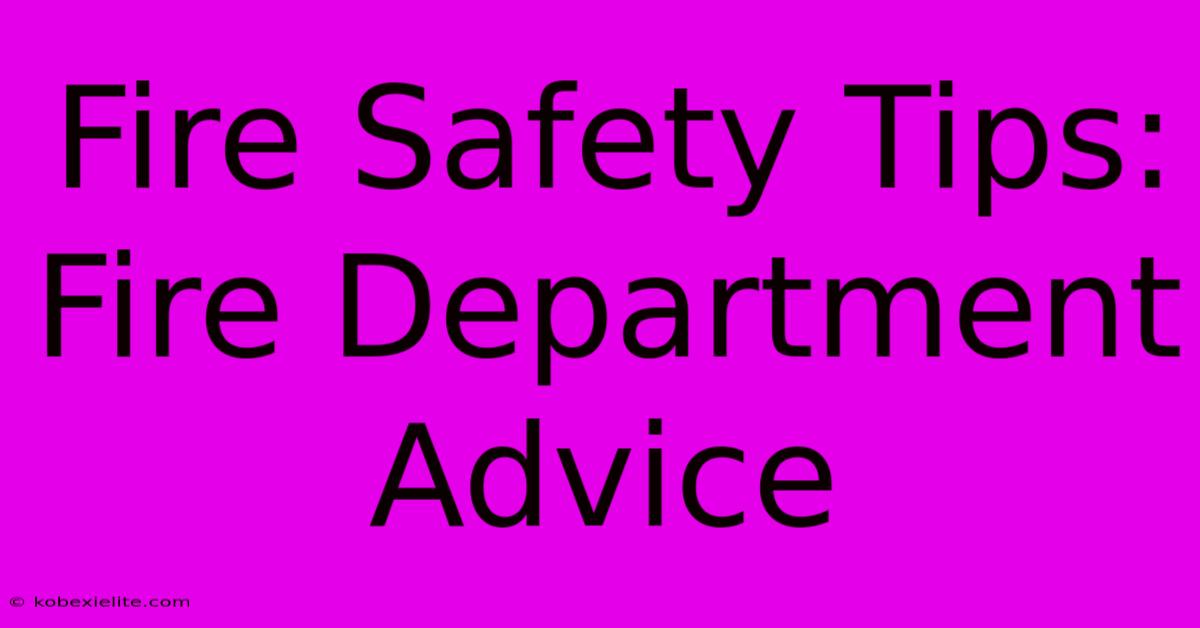Fire Safety Tips: Fire Department Advice

Discover more detailed and exciting information on our website. Click the link below to start your adventure: Visit Best Website mr.cleine.com. Don't miss out!
Table of Contents
Fire Safety Tips: Fire Department Advice
Fire safety isn't just about knowing what to do in a fire; it's about preventing one in the first place. This comprehensive guide, based on advice from fire departments nationwide, will equip you with the knowledge and tools to protect your home and family. We'll cover everything from creating a fire escape plan to understanding the importance of regular maintenance.
Preventing Fires: The First Line of Defense
The best way to deal with a fire is to prevent it altogether. Here are some crucial steps you can take:
Kitchen Safety:
- Unattended Cooking is a Major Culprit: Never leave cooking unattended. Step away from the stove for even a moment, and you risk a grease fire or other kitchen emergency.
- Keep Flammables Away: Store flammable materials like oven mitts, dish towels, and paper products away from the stovetop and oven.
- Grease Fire Safety: If a grease fire starts, never use water. Turn off the heat source if possible and smother the flames with a lid or baking soda. If the fire is out of control, evacuate immediately and call 911.
- Proper Ventilation: Ensure your kitchen has proper ventilation to avoid the build-up of flammable gases.
Electrical Safety:
- Overloaded Outlets: Don't overload electrical outlets. Using too many appliances on a single circuit can cause overheating and fire.
- Damaged Cords: Replace any frayed or damaged electrical cords immediately.
- Space Heaters: Use space heaters cautiously, keeping them away from flammable materials and ensuring they are turned off when you leave the room or go to sleep. Never leave them unattended.
Smoking Safety:
- Designated Smoking Areas: If you smoke, designate a safe smoking area away from flammable materials, with a sturdy ashtray. Never smoke in bed.
- Properly Dispose of Ashes: Dispose of cigarette butts and ashes in a non-flammable container filled with water or sand.
Heating Safety:
- Chimney Inspection: Have your chimney inspected and cleaned annually to prevent creosote buildup, a major cause of chimney fires.
- Space Heater Placement: Keep space heaters at least three feet away from anything that can burn.
- Fuel-Burning Appliances: Ensure all fuel-burning appliances, such as furnaces and water heaters, are properly vented and maintained.
Creating a Fire Escape Plan: Your Roadmap to Safety
A well-rehearsed escape plan is critical in the event of a fire.
Key Elements of a Fire Escape Plan:
- Multiple Escape Routes: Identify at least two ways to escape from each room.
- Meeting Place: Establish a designated meeting place outside the home where everyone can gather after escaping.
- Practice Drills: Regularly practice your fire escape plan with everyone in the household, including children and pets. Make it a family activity!
- Smoke Alarms: Install smoke alarms on every level of your home, inside and outside bedrooms, and test them monthly. Replace batteries annually.
What to Do During a Fire
If a fire breaks out:
- Get Out Immediately: Don't attempt to fight the fire yourself; your safety is paramount.
- Close Doors Behind You: Closing doors helps contain the fire and slow its spread.
- Call 911: Call 911 from a safe location once you are outside.
- Stay Low: Smoke rises, so staying low to the ground can help you breathe easier and escape more quickly.
- Never Go Back Inside: Once you're out, stay out.
Maintaining Your Fire Safety Equipment
Regular maintenance is key to ensuring your safety equipment is functioning properly.
- Smoke Alarm Testing: Test your smoke alarms monthly.
- Fire Extinguisher Inspection: Check your fire extinguisher regularly to ensure it's charged and ready to use. Know how to operate it correctly.
- Carbon Monoxide Detector: Install and test carbon monoxide detectors regularly.
By following these fire safety tips, you significantly reduce the risk of fire and improve your chances of survival should a fire occur. Remember, prevention and preparedness are your best defenses against the devastating effects of fire.

Thank you for visiting our website wich cover about Fire Safety Tips: Fire Department Advice. We hope the information provided has been useful to you. Feel free to contact us if you have any questions or need further assistance. See you next time and dont miss to bookmark.
Featured Posts
-
Best To Worst Bridget Jones Films
Feb 15, 2025
-
Live Updates Waratahs Vs Highlanders Rugby
Feb 15, 2025
-
Issa Rae Pulls Out Of Kennedy Center
Feb 15, 2025
-
Steam Deck Avowed Setup Guide
Feb 15, 2025
-
Aaron Rodgers Four Teams Could Acquire Him
Feb 15, 2025
